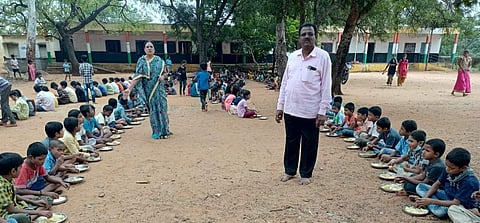

A group of people including activists, academicians, research scholars, advocates and doctors have written an open letter to the Primary and Secondary Education Minister, BC Nagesh. The letter stresses on providing eggs as part of children's mid-day meals on all seven days instead of providing it only for three days. It also states why the government is providing eggs to the schools only in seven districts instead of providing it across the state. Around 17 organisations and 57 individuals have supported this idea through an open letter to the minister and the state government.
This open letter states that it is important for the government to uphold the Right to Food of every child as mentioned in the National Food Security Act 2013. Swati Narayan, Activist, Right to Food Campaign, says, "This is very much needed to reduce malnutrition and promote the health of children. We feel that religion or emotions shouldn't be mixed when it comes to consumption of food. Our food is our right and emotions can restrict the choice of food that we make. We think eggs should be provided as part of the mid-day meal scheme on all school days to all children in Karnataka, who are used to consuming it. Infact, eggs are easy to be stored and given to children rather than storing and providing milk."
According to the National Family Health Survey (NFHS) 2019-20, most children in Karnataka do not reach their ideal height and weight at the right age. Stunting (less height for age) of 35.4% and being underweight (less weight for age) of 32.9% are common in children even before they start their school life, and this is much more so in children from socially and economically poor communities. While these are the figures from the pre-pandemic times, the citizens feel that these figures might have worsened during the pandemic and lockdown.
Swati further adds, "We have prepared a map where it shows that around 14 states don't provide eggs to children in mid day meals and Karnataka has been the only South Indian state that has not provided eggs as part of mid-day meals, inspite of the fact that 94% students in the government and aided schools belong to communities that eat eggs. According to the National Family Health Survey-4 (2015-16) at least 83% of the state’s population does not have any cultural or religious objections to consuming eggs. States like Tamil Nadu and Andhra Pradesh with budgets comparable to Karnataka provide eggs atleast five times a week. The provision of egg is important because it is a low-cost, easy to cook, culturally acceptable and locally available alternative with high protein component with biological value of 100 as compared to 60-70 for pulses (dal) and a good source of all vitamins. Children who cannot consume eggs can be offered a seasonal fruit, additional milk or curd."
But what are the costs that the state might incur if they provide eggs five days in a week across the state. According to the analysis of these individuals, Karnataka would need an allocation of Rs 370 crore for three eggs a week and Rs 617 crore for 5 eggs a week for children from classes 1 to 10. (5% administrative expense, 44 weeks of schooling a year at Rs 5/egg). This would be approximately 2.32% of total education department budget and just 0.05% of the GDP.
So what is the way forward? According to Vinay Sreenivasa, state governments need a good push to provide a proper nutritious meal to children. He says, "There are a lot of changes that needs to be done if we have to reduce the rate of malnutrition in Karnataka. We demand that the government provide eggs mandatorily to the children in all the 31 districts of Karnataka on a daily basis. The contract for the supply of mid day meals should be given to local self-help or women’s groups instead of giving it to one particular organisation where they cook food in one centralised kitchen which is cold by the time it reaches to different schools. This way. the government will be able to support the livelihood of communities as well. Milk or milk powder should be provided to the school-children under the Ksheera Bhagya scheme daily. This milk should be reconstituted at the school and provided fresh to the children. Currently, the milk is reconstituted and then transported from centralised kitchens to schools. School-based kitchens should be set up in all schools. All centralised contracts should be cancelled immediately."
He further adds, "Extra effort has to go to ensure that children in tribal belts, dalit children, children from OBC communities are not left out. Infact, I beleive the government must also provide meat in schools. Children who are supposed to eat will eat it and those who don't want to eat will not do so. The focus should move from cereals/millets and fortification to a more diverse and nutrient dense diet. In order to do so the state as a duty bearer must increased the per unit cost of the mid day meals. After all this is done, schools must organise regular health check ups through primary health care units, health department and provide iron tablets and other necessary supplements."
